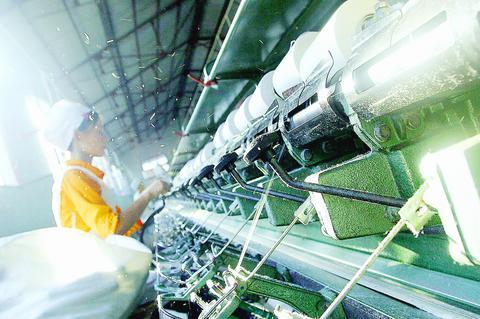China overtook the US as a top global destination for foreign direct investment (FDI) last year while the Asia-Pacific region attracted more investment than any other developing region, a UN report said last week.
China's strong manufacturing industry helped the country attract FDI last year worth US$53.5 billion, compared with US$52.7 billion in 2002, the UN Conference on Trade and Development (UNCTAD) said in its annual report on investment flows.

PHOTO: EPA
Meanwhile, foreign investment in the US, traditionally the largest recipient of such money, plunged by 53 percent last year to reach US$30 billion, the lowest level in 12 years, according to data from UNCTAD's World Investment Report 2004.
Flows to the Asia-Pacific region as a whole rebounded over the year to US$107 billion from US$94 billion in 2002 driven by strong economic growth and a better investment environment, the agency said.
China was expected to continue to attract foreign companies, analysts said.
"According to our analysis, FDI in China has not peaked although their economic growth rates have fallen," UNCTAD economist James Zhan told journalists.
The outbreak of SARS only had a marginal downward effect on investment activity as Asia emerged from the decline in foreign investment it had experienced since 2001, the report noted.
"Prospects for a further rise in foreign direct investment flows to Asia and the Pacific in 2004 are promising," UNCTAD's Deputy Secretary General, Carlos Fortin, said in a statement.
But the distribution of the new wealth was uneven across the region, with most of the money -- US$72 billion -- concentrated in north-east Asia. Flows to south-east Asia rose 27 percent to US$19 billion, while the south merely received US$6 billion in FDI.
Resource-rich central Asia recorded US$6.1 billion, and US$4.1 billion flowed into the west.
The manufacturing sector remained the dominant factor that pulled investment into China, but a rise in investment in the services industry was noted elsewhere in line with the global trend, UNCTAD said.
Services, including finance, tourism, telecommunications and information technology, formed a growing proportion of foreign direct investment stock in the region -- up to 50 percent in 2002, the most recent figure available, from 43 percent in 1995, UNCTAD said.
UNCTAD said the growing tendency to shift some business activities overseas to places where labor costs are low but the workforce is skilled helped to raise the region's profile.
Asian companies were also growing in power and reach as investors in other regions, according to the Geneva-based agency.
China and India were joining Malaysia, South Korea, Singapore and Taiwan as sources of foreign direct investment, it said.
Asian firms, such as Hutchinson Whampoa of Hong Kong, Singapore's Singtel and Samsung of South Korea, again dominate the UNCTAD list of the top companies from the developing world.

Sweeping policy changes under US Secretary of Health and Human Services Robert F. Kennedy Jr are having a chilling effect on vaccine makers as anti-vaccine rhetoric has turned into concrete changes in inoculation schedules and recommendations, investors and executives said. The administration of US President Donald Trump has in the past year upended vaccine recommendations, with the country last month ending its longstanding guidance that all children receive inoculations against flu, hepatitis A and other diseases. The unprecedented changes have led to diminished vaccine usage, hurt the investment case for some biotechs, and created a drag that would likely dent revenues and

Macronix International Co (旺宏), the world’s biggest NOR flash memory supplier, yesterday said it would spend NT$22 billion (US$699.1 million) on capacity expansion this year to increase its production of mid-to-low-density memory chips as the world’s major memorychip suppliers are phasing out the market. The company said its planned capital expenditures are about 11 times higher than the NT$1.8 billion it spent on new facilities and equipment last year. A majority of this year’s outlay would be allocated to step up capacity of multi-level cell (MLC) NAND flash memory chips, which are used in embedded multimedia cards (eMMC), a managed

CULPRITS: Factors that affected the slip included falling global crude oil prices, wait-and-see consumer attitudes due to US tariffs and a different Lunar New Year holiday schedule Taiwan’s retail sales ended a nine-year growth streak last year, slipping 0.2 percent from a year earlier as uncertainty over US tariff policies affected demand for durable goods, data released on Friday by the Ministry of Economic Affairs showed. Last year’s retail sales totaled NT$4.84 trillion (US$153.27 billion), down about NT$9.5 billion, or 0.2 percent, from 2024. Despite the decline, the figure was still the second-highest annual sales total on record. Ministry statistics department deputy head Chen Yu-fang (陳玉芳) said sales of cars, motorcycles and related products, which accounted for 17.4 percent of total retail rales last year, fell NT$68.1 billion, or

In the wake of strong global demand for AI applications, Taiwan’s export-oriented economy accelerated with the composite index of economic indicators flashing the first “red” light in December for one year, indicating the economy is in booming mode, the National Development Council (NDC) said yesterday. Moreover, the index of leading indicators, which gauges the potential state of the economy over the next six months, also moved higher in December amid growing optimism over the outlook, the NDC said. In December, the index of economic indicators rose one point from a month earlier to 38, at the lower end of the “red” light.